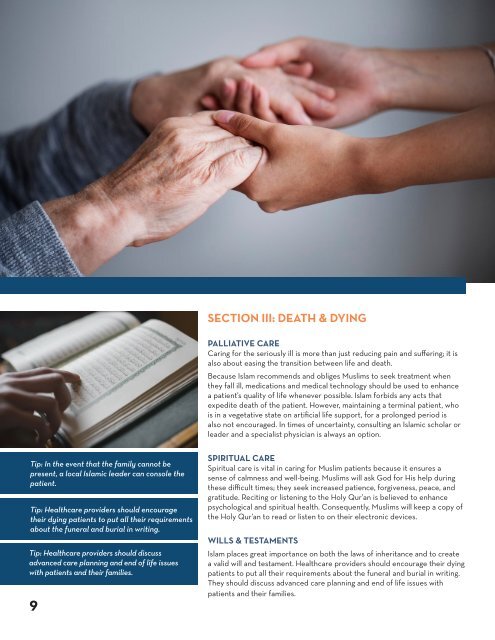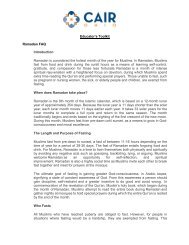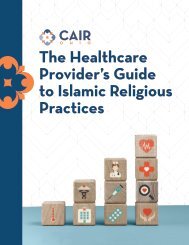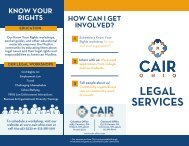CAIR-Ohio-Healthcare-Providers-Guide (2022)
You also want an ePaper? Increase the reach of your titles
YUMPU automatically turns print PDFs into web optimized ePapers that Google loves.
SECTION III: DEATH & DYING<br />
PALLIATIVE CARE<br />
Caring for the seriously ill is more than just reducing pain and suffering; it is<br />
also about easing the transition between life and death.<br />
Because Islam recommends and obliges Muslims to seek treatment when<br />
they fall ill, medications and medical technology should be used to enhance<br />
a patient’s quality of life whenever possible. Islam forbids any acts that<br />
expedite death of the patient. However, maintaining a terminal patient, who<br />
is in a vegetative state on artificial life support, for a prolonged period is<br />
also not encouraged. In times of uncertainty, consulting an Islamic scholar or<br />
leader and a specialist physician is always an option.<br />
Tip: In the event that the family cannot be<br />
present, a local Islamic leader can console the<br />
patient.<br />
Tip: <strong>Healthcare</strong> providers should encourage<br />
their dying patients to put all their requirements<br />
about the funeral and burial in writing.<br />
Tip: <strong>Healthcare</strong> providers should discuss<br />
advanced care planning and end of life issues<br />
with patients and their families.<br />
9<br />
SPIRITUAL CARE<br />
Spiritual care is vital in caring for Muslim patients because it ensures a<br />
sense of calmness and well-being. Muslims will ask God for His help during<br />
these difficult times; they seek increased patience, forgiveness, peace, and<br />
gratitude. Reciting or listening to the Holy Qur’an is believed to enhance<br />
psychological and spiritual health. Consequently, Muslims will keep a copy of<br />
the Holy Qur’an to read or listen to on their electronic devices.<br />
WILLS & TESTAMENTS<br />
Islam places great importance on both the laws of inheritance and to create<br />
a valid will and testament. <strong>Healthcare</strong> providers should encourage their dying<br />
patients to put all their requirements about the funeral and burial in writing.<br />
They should discuss advanced care planning and end of life issues with<br />
patients and their families.
















